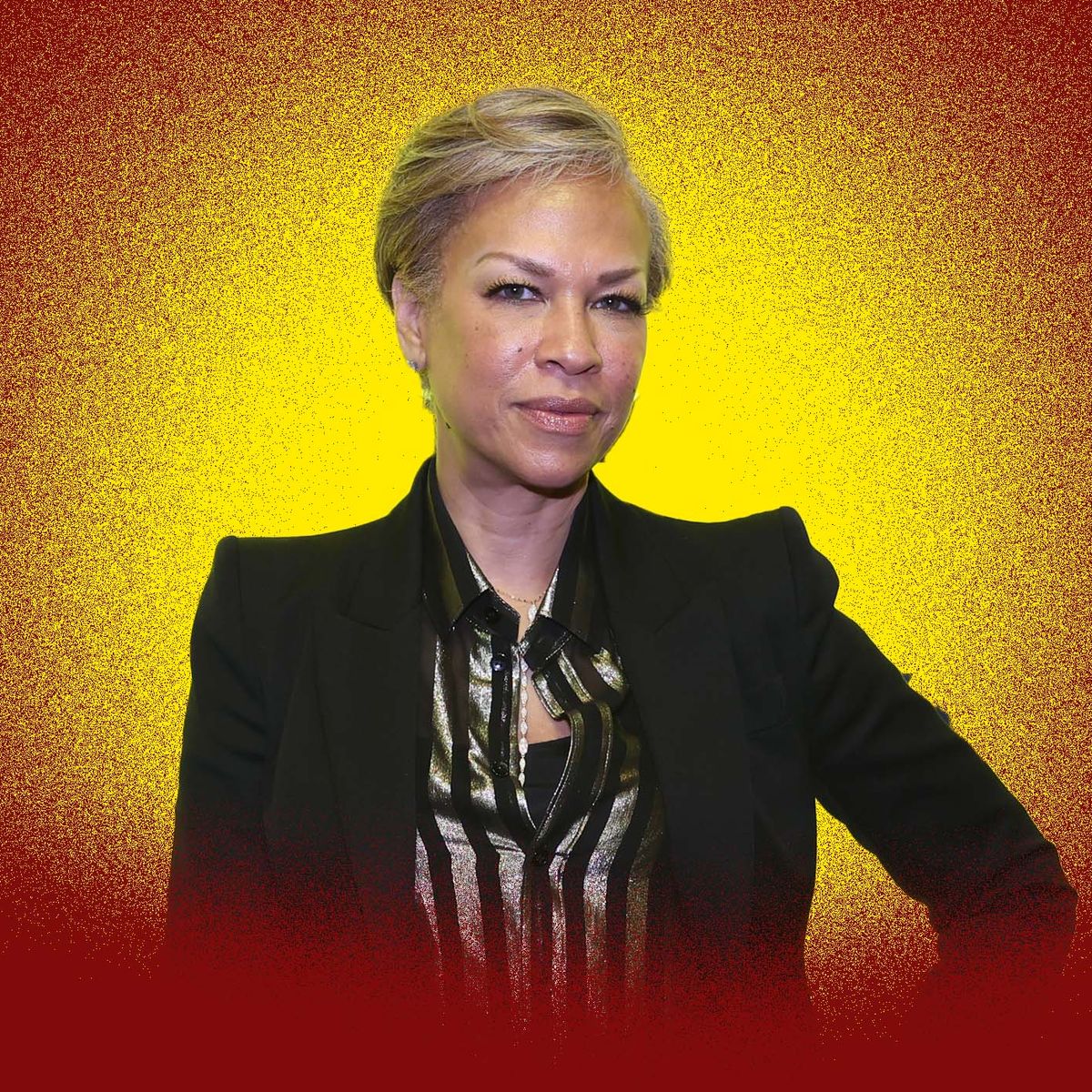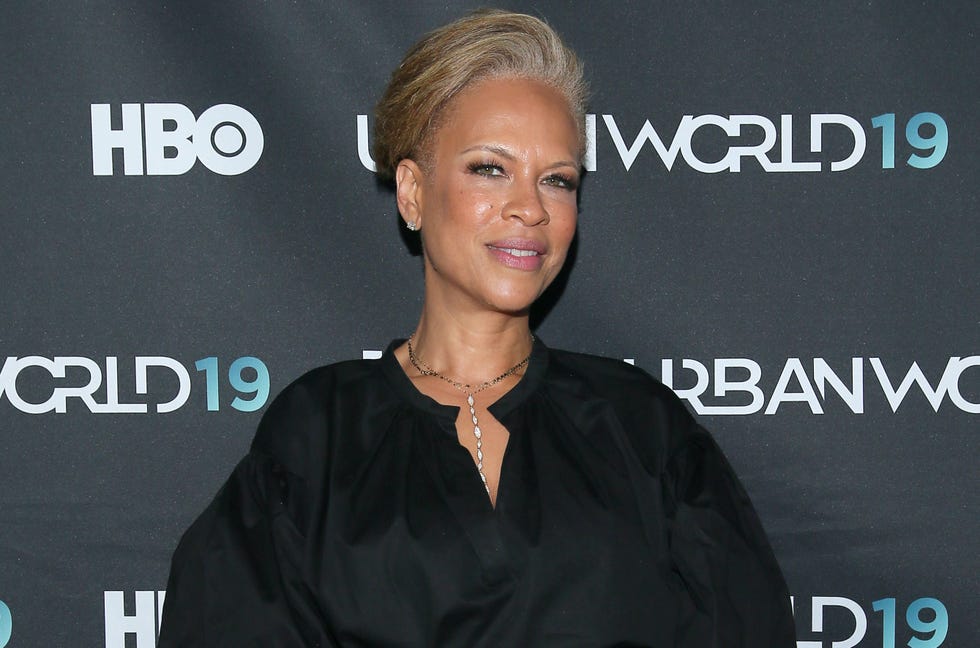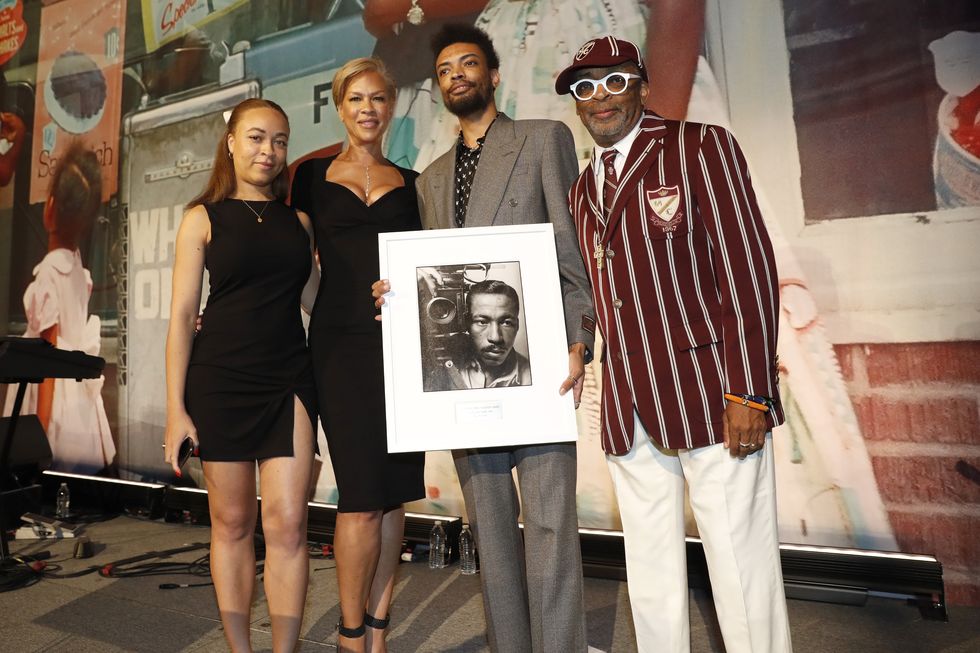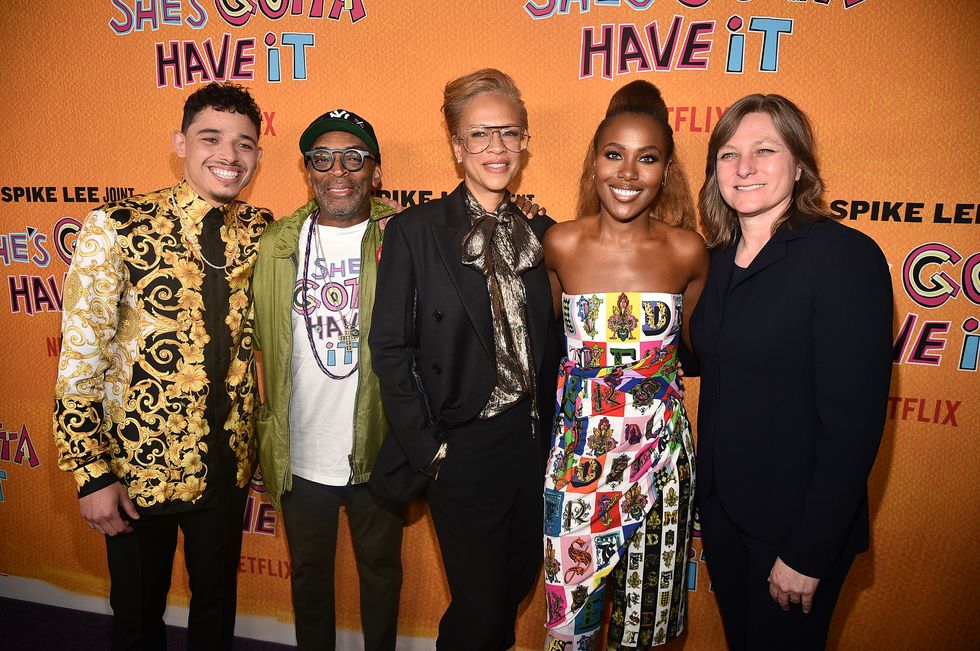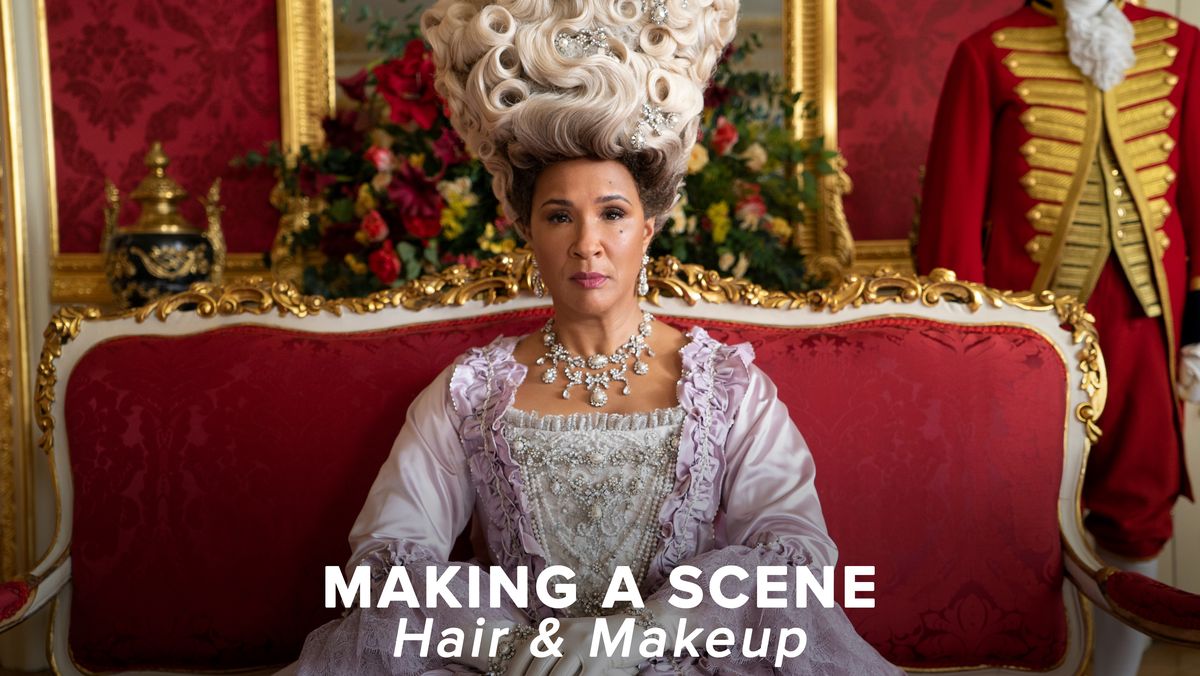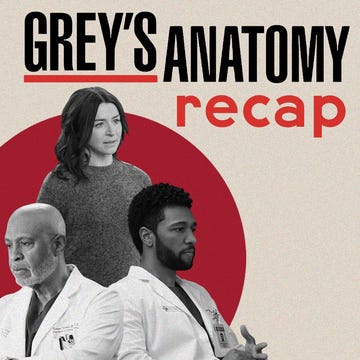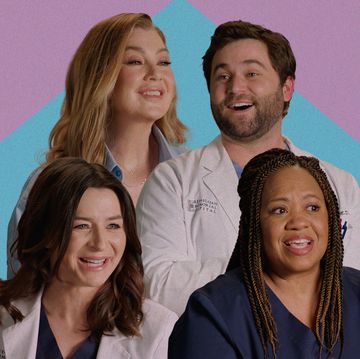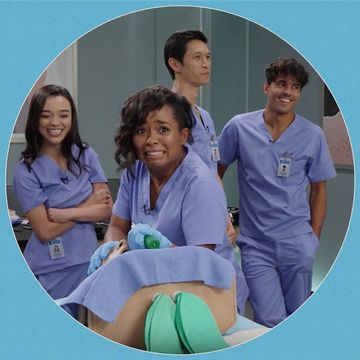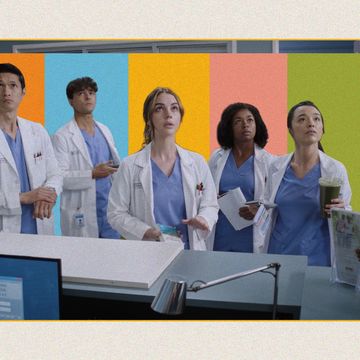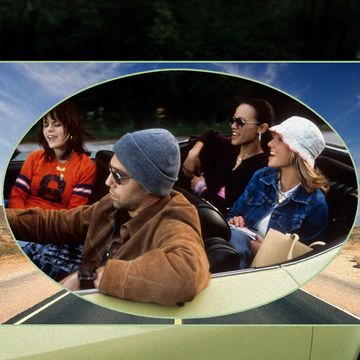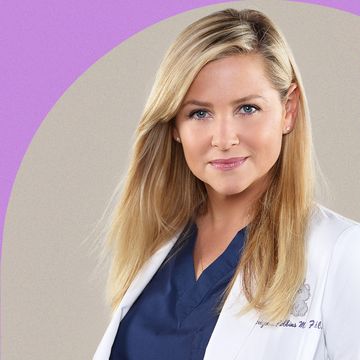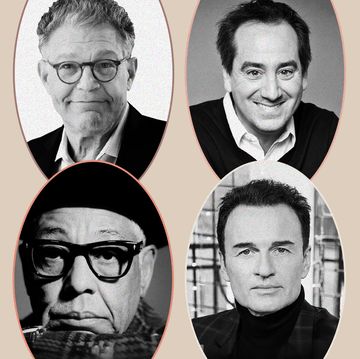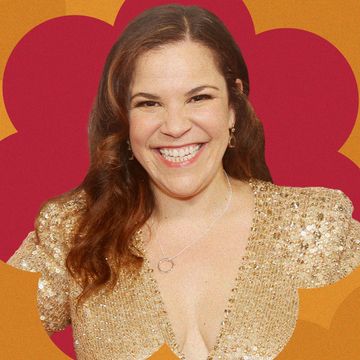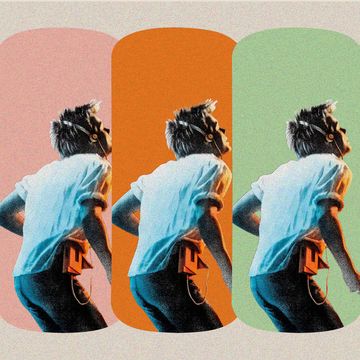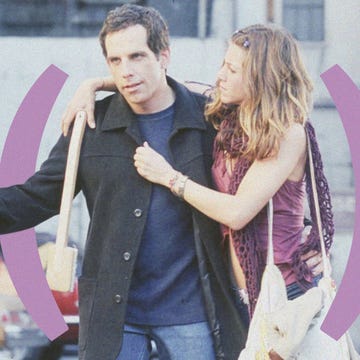Tonya Lewis Lee is much more than just the wife of director Spike Lee. Lewis Lee is a director in her own right, a writer, producer, and advocate for women’s health.
She and her husband were recipients of a Gordon Parks Foundation Award at the foundation’s annual dinner and auction in New York City on May 19. The foundation, which focuses on preserving the work of late photographer Gordon Parks, awards the special honor to individuals who “have enriched our lives in ways that reflect Parks' ideas and goals by using creative means to inspire the next generation,” according to the organization's official website. The Lees were honored for their commitment to social justice in their work in the arts.
She and Lee married in 1993, and they have two children, Satchel Lee, 27, and Jackson Lee, 25 (both were Golden Globes ambassadors in 2021, making history as the first siblings of color to fill the roles).
Lewis Lee is often overlooked for her contributions to film and TV, but she is a talented filmmaker in her own right.
In fact, it was Lewis Lee’s idea for Lee to bring back his iconic 1986 film She’s Gotta Have It and turn it into a Netflix series, which was a huge hit from 2017 to 2019. Lewis Lee acted as co-executive producer on the show with her husband, helping shape the series to represent the female perspective, from the inner monologues to the sex scenes.
Long before it was the trend for women in entertainment to start their own production companies and take the reins behind the scenes — whether it’s Kerry Washington’s Simpson Street, which she founded in 2016; Reese Witherspoon’s Hello Sunshine, founded the same year; or Tina Fey’s film and TV production company, Little Stranger Inc., founded in 2001 — Lewis Lee was ahead of the curve. In 1998, she founded her own media production company, Madstone Company Inc., during a time when women weren’t exactly celebrated for going behind the scenes.
She first got her start as a lawyer in Washington, D.C., then moved to New York and continued her career as a producer with Nickelodeon through a contact at her former law firm.
In 2011, she co-founded ToniK Productions alongside award-winning TV producer Nikki Silver, and they’ve focused on adapting books for family-friendly films (one project was an adaptation of Christopher Paul Curtis’ award-winning novel The Watsons Go to Birmingham — 1963, which was adapted for the 50th anniversary of the civil rights movement).
Lewis Lee also produced the documentary film Crisis in the Crib: Saving Our Nation’s Babies and, more recently, Aftershock, an award-winning documentary that she co-directed with Paula Eiselt. The film, which premiered at Sundance Film Festival this January, follows two men, Omari Maynard and Bruce McIntyre III, both fathers who lost their female partners during childbirth complications, which were both preventable.
Lewis Lee is the author of three children’s books with Simon & Schuster, and her long list of advocacy for mother’s rights includes being the spokesperson for “A Healthy Baby Begins With You,” an awareness campaign spearheaded by the U.S. Department of Health’s Office of Minority Health, from 2007 to 2013.
Even though Lewis Lee is more of a behind-the-scenes person, she’s still open to talking about her achievements and goals. She speaks to Shondaland about her new documentary, talking about minority health with Vice President Kamala Harris, and the importance of the female gaze in filmmaking (even when it upsets her husband).
NADJA SAYEJ: What does this Gordon Parks Foundation Award mean to you?
TONYA LEWIS LEE: Oh, my gosh, to get an award from the Gordon Parks Foundation is an extreme honor. I’ve grown up with Gordon Parks’ images around me; all of us have. Just to be recognized, I have to say, for my work, trying to shed light on social justice issues, is deeply meaningful to me.
NS: Do you remember first getting into film and TV producing? You are trained as a lawyer, correct?
TLL: I am a lawyer by trade. But it’s funny — when I was in high school, I took a class on production. I really wanted to get into TV, but I didn’t know how to do it, so I ended up going to law school. How I got into it? I had a colleague that I worked with at my law firm, because I was practicing for a couple of years, who moved over to Nickelodeon. I wasn’t practicing law anymore, I had two young children, and I said, “I think I want to produce.” He said to me, “Why don’t you come in for an exploratory interview?” I went into Nickelodeon and started doing small PSAs [public service announcements] for them. That’s how I learned how to produce and direct, with a supportive team around me helping me learn.
NS: Trial by fire.
TLL: Yep.
NS: Now we’re in a time when many women — often actors — have decided to go behind the screen with their own production companies. You’re a pioneer of that. Why is that? Is it because they want more control of how they’re portrayed? Is it because they want to take control of the female gaze?
TLL: First of all, I think it’s very hard. God bless actresses. You only get the roles that are out there and available, right? For one, I think women want to create and tell stories in a way that you see them. I do think it’s about the female gaze. I think that we are finally at a place where we say, “Hold on a second. The way a story is told, the way a shot is framed, depends on who is behind the camera.” It’s so funny; my husband and I worked on She’s Gotta Have It. There was a shot of a man. When the main character, Nola Darling [DeWanda Wise], sees him, it’s like, “He’s so sexy.” My husband didn’t really want to do it the way we wanted him to do it. There was a real conversation about showing this man from the female gaze. He does the women with his gaze, but we wanted it our way. Ultimately, we got as close as we could with him on that one.
NS: It’s interesting; the lesbian sex scenes in the She’s Gotta Have It series are quite sexy.
TLL: It is.
NS: What were the conversations like around that?
TLL: You know, it’s funny. I really try to allow my husband to do what he does. He and the actress, DeWanda Wise, had conversations about that. There were conversations, to me, about parody. When there were scenes with the men, we had to do a reshoot. That, I called. Because I was like, “What the hell is going on here? This can’t just be from the gaze from the man on the woman.” It’s difficult for him. He doesn’t have that sensibility. He’s a man. It’s hard for him.
NS: I remember interviewing Spike Lee in 2017, when the show first launched, and he said it was all your idea, which I loved.
TLL: [Laughs] It was. And I had to think, “Right, this is a man’s view of a woman.” But to me, it was a woman’s story. We had amazing female executives working on the show, as well. We had a lot of female energy on that show, and DeWanda Wise is a strong woman herself. We had a lot of conversations about who Nola is in this day and age.
NS: In the new documentary you just co-directed, Aftershock, what was the experience like for you? It’s such a difficult topic.
TLL: It is. We were fortunate enough to work with families who were unfortunate enough to have lost someone due to childbirth complications. These men loved their partners so deeply. They turned that grief or that love into action. And their love for their community. I was tremendously inspired by the people I met and got to follow. I cried a lot throughout the process. I don’t want women to be afraid; it’s about being empowered and inspired — getting the knowledge. There’s a lot of problems in the world we can’t fix or solve, but this is one that we can. We can have better birth outcomes in the U.S. It’s my hope the film is a conversation starter or continuer, that that happens.
NS: I can’t believe that midwives and doulas are sometimes not covered by health insurance in the U.S. I can’t wrap my head around that. It’s childbirth.
TLL: It’s so crazy, and that’s why we have the outcomes that we do. The eradication of midwives is based on a racist concept. So, we’re all suffering, based on racism.
NS: What were your talks like when you brought this up to Vice President Kamala Harris?
TLL: It’s funny you asked that. The first conversation I had with her was when she was running for president. She asked, “What are you concerned about?” And I told her my issue. She said, “I’m right there with you; it’s important to me.” She has been a tremendous champion. She knew what the stats were, what the issue was, and she has been true to her word about the issue of maternal mortality.
NS: Now, we have Black Maternal Health Week every April, thanks to the Black Mamas Matter Alliance, right? As of 2021, it has been officially recognized by the White House.
TLL: Exactly. There’s the week and the bills that are going through Congress called the Black Maternal Health Momnibus Act of 2021. Some bills are getting passed; some are taking longer. But it is happening. Her leadership has been really important.
NS: You talk about implicit-bias training in hospitals, when talking about this documentary. What are your thoughts around that?
TLL: Well, a lot of bias is not that implicit. Some of it is pretty explicit. We say implicitly to be gentle about it, so we don’t want people to feel funny about their bias or racism. But it’s a real thing. They’re getting constant messages about white supremacy. We’re all dealing with that. It’s about being able to stop and take stock and say, “Am I acting how society is telling me to be acting, or am I acting really human to human?”
NS: In 2022, is it what society is telling you to do, or what social media is telling you to do? That’s influencing people a lot today.
TLL: It’s so tricky. The social media thing. It’s so sad to me, honestly. But I’m staying optimistic. I’m looking at the information young people are being fed — I thought we were moving along, and young people are committing racist acts as if we were back in 1920. It’s a sad thing. We keep working and try to make it better.
NS: What advice do you have for women who want to get into directing and producing roles?
TLL: It’s a lot of work. It depends on who you are and what you want out of your life. For me, I had a family; when my children were younger, I kept my career on the back burner. Now that my kids are older, I can really take the time. It’s a lot of time to take away from your family. I would say, take every opportunity that works within your life and do the work. Every project, it’s all collaboration. Find good people to work with. You can’t do it alone. Have tough skin. This is not about people being nice to you. I have dealt with people who said crazy things to me, who are rude to me, people who think I don’t know. You have to have tough skin and keep fighting through it. Stay focused on your mission.
NS: What’s the best part about being a mom?
TLL: In a way, having children — I had a midwife explain it to me, “When a woman births a child, she’s not only birthing a child; she’s birthing a mother.” I think that you discover as a mother how powerful and strong you are. Through everything, if you can guide them along, it’s amazing how powerful we really are.
Nadja Sayej is an arts and culture journalist based in New York City who has written five books, including Biennale Bitch and The Celebrity Interview Book.
Get Shondaland directly in your inbox: SUBSCRIBE TODAY
